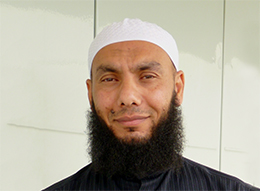03 May 2016
 South Australia is set to become one of the largest research concentrations in Islamic studies with the announcement today of a new Centre for Islamic Thought and Education (CITE), to be based at the University of South Australia.
South Australia is set to become one of the largest research concentrations in Islamic studies with the announcement today of a new Centre for Islamic Thought and Education (CITE), to be based at the University of South Australia.
The new Centre will be led by one of Australia’s most respected Muslim academic scholars, public intellectual and religious leaders, Professor Mohamad Abdalla, and will bring together researchers specialising in Islamic psychology, ethics and business, leadership and management, finance and education.
Announcing the new Centre, UniSA Vice Chancellor Professor David Lloyd says its goal is to promote and encourage understanding of evidence-based knowledge of Islam and the issues facing Muslims in Australia and globally, through education and engagement with the wider Australian community.
“The Centre will be a knowledge hub for community empowerment through research, education and engagement, a hub that is open to collaborate with international partners, government departments and non-government bodies here in Australia and around the world,” Prof Lloyd says.
“The opportunities for the new Centre to raise awareness and drive engagement with the wider community are boundless.”
Prof Abdalla will join UniSA’s Division of Education, Arts and Social Sciences, coming from Griffith University where he is Professor of Islamic Studies at the School of Humanities, Languages and Social Science and where he established and led Griffith’s first Islamic Research Unit (GIRU) in 2006, also establishing Islamic studies as a discipline at the university.
In 2008 he won, with colleagues from the University of Melbourne and the University of Western Sydney, Federal Government backing for an $8 million National Centre of Excellence for Islamic Studies (NCEIS), spearheading the development of an undergraduate major in Islamic studies that has been adopted by other universities; he is currently Director of the Queensland node of the NCEIS.
Prof Abdalla is an expert in Islamic civilisation and its interconnectedness with the Western civilisation, Islam in Australia, Islamic thought and Islamic ethics. He has published widely in Islamic studies with reputable publishers; co-edited a book on Islam in the Australian News Media; and has a forthcoming book titled Interconnectedness of Civilisations: Islam and the West (University of Melbourne Press).
Since the tragic events of 11 September 2001, and subsequent local and global events, Professor Abdalla has worked tirelessly to establish open and respectful dialogue between people of diverse faith traditions and persuasions, and is well respected and regarded among many communities in Australia and abroad.
“In an increasingly globalised world the varied problems facing Muslim societies present new and complex challenges, which need to be addressed from a strength-based approach,” Prof Abdalla says.
“One of the founding values of the Centre will be the clear focus on genuine and meaningful engagement, which will provide for valuable two way conversations and insights between the Muslim and broader community.
“The vision of the Centre for Islamic Thought and Education (CITE), therefore, is a revival in Islamic thought and scholarship that facilitates interconnectedness and empowerment for local, regional and global communities.
“The Centre will build on the great work already being undertaken in South Australia both at the academic and community level and work with UniSA’s School of Education to design strength based programs and projects informed by Islamic thought as well as the Australian context for communities, schools and non-government organisations.”
Media Contact
Will Venn office (08) 8302 0096 mobile 0401 366 054 email will.venn@unisa.edu.au




